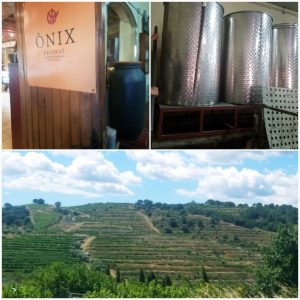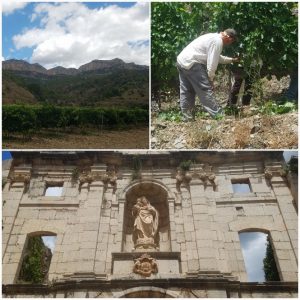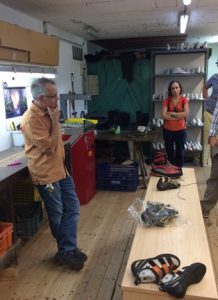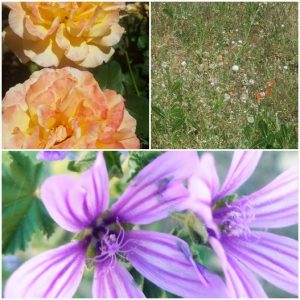Field Trip to Priorat
By Heather Gillich and Luca Annesi
The beauty of the Priorat is a welcome view from our transport today. As we leave the, now familiar, campus of the UAB to embrace the wonder that awaits in this rural area, we reflect on our expectations for the day. During the ICRPS process, we have been learning about the challenges and rewards for applying the comparative analysis approach to considering the information and experiences of this trip. It will be a challenge to keep a keen eye to learning in this way as we embrace the view and eagerly await the experiences to come.

Priorat wine and landscape.
Heather Gillich photo
Our stop in Grallatops, to La Vinícola del Priorat, is a wonderful experience and provides many opportunities for reflection on the power of cooperative effort and the effects of ecological systems on the systems of society. As much of our work in communities has focused on food systems, we are full of questions about approach and ideology in creating and maintaining the collaborative. We are quickly reminded that the efficacy of the group has little to do with the many pedagogical approaches we have had experience in using, but relies heavily on the inherent skill and spirit of the group. We are impressed by the knowledge, commitment, and passion of the people at La Vinícola del Priorat to support the collective production of wonderful local products. Likewise, the connection of this effort to the land is evident as they present information about the effects of phylloxera, and the resulting afforestation, we are reminded of the interconnectedness of human effort and natural systems.

Priorat vines and monastery.
Heather Gillich photo
This theme continues as we move on to the Carthusian Monastery of Escaladei. Walking from the transport, we can see the results of the abandonment of terraces and the encroachment of the forest. Though, from our perspective, the area is beautiful and the trees are a welcome sight, we now are aware of what this process means for the landscape and people of the area. We take in the view while considering the taxa of trees present and their possible relationships to the water scarcity that is present in the area.
Water scarcity is a concern we have not experienced in our efforts to be an active participants in food systems. The areas where we have farmed, and eaten, have mostly had steady access to water and arable land. In this light, we are further impressed by the spectacular meal provided to us at the Celler Ronadelles. Jaume Giral’s passion for the food and wine he produces is evident in each bit of the meal. The efforts to connect this passion for the local land with food that excites the palate, are well spent. Cornudella benefits greatly from the passion of great people. The Celler enhances the area and complements the beauty of the surrounding landscape.

Cornudella climbing shop
Heather Gillich photo
We were pleased to learn of the rock climbing community in Cornudella, and glad to see the commitment to place that their presence indicates. The area provides a haven for rock climbers who have a commitment to connection with their bodies and with the landscape.
We have the great fortune to know people who chose to go to live with their own family at the foot of the mountain, or to run a climber’s shop and coffee shop here. In addition to this the best service offered to climbers is the repair of mountain shoes. He is so good at this that repair requests come from all over Europe! We have learned that thanks to the existence of rural environments some people are able to live in serenity and in contact with their passions. At the same time these rural areas remain alive thanks to people who choose them as their home.

Priorat flowers
Heather Gillich photo
All of this experience can be understood as it relates to agrifood systems through the roles of people in the environment. People are a part of the ecosystem, not outside it. As the popularity of the Priorat area increases, this interconnectedness will become an increasingly important in the revitalization efforts. Though the area is experiencing a decrease in residential population, these efforts can increase pride in the products and landscapes in the Priorat and can lead to increases in the opportunities for people. Those who live in the Priorat have an opportunity to increase the vitality of the area for themselves, and as a tourist destination. With residential and tourist populations in mind… everybody eats. Agrifood systems can, and will, continue develop in the area to meet the needs of the people there. With an eye to environmental management, an agrifood system has a role in mitigation of climate change as well as in providing nutritional resources.
